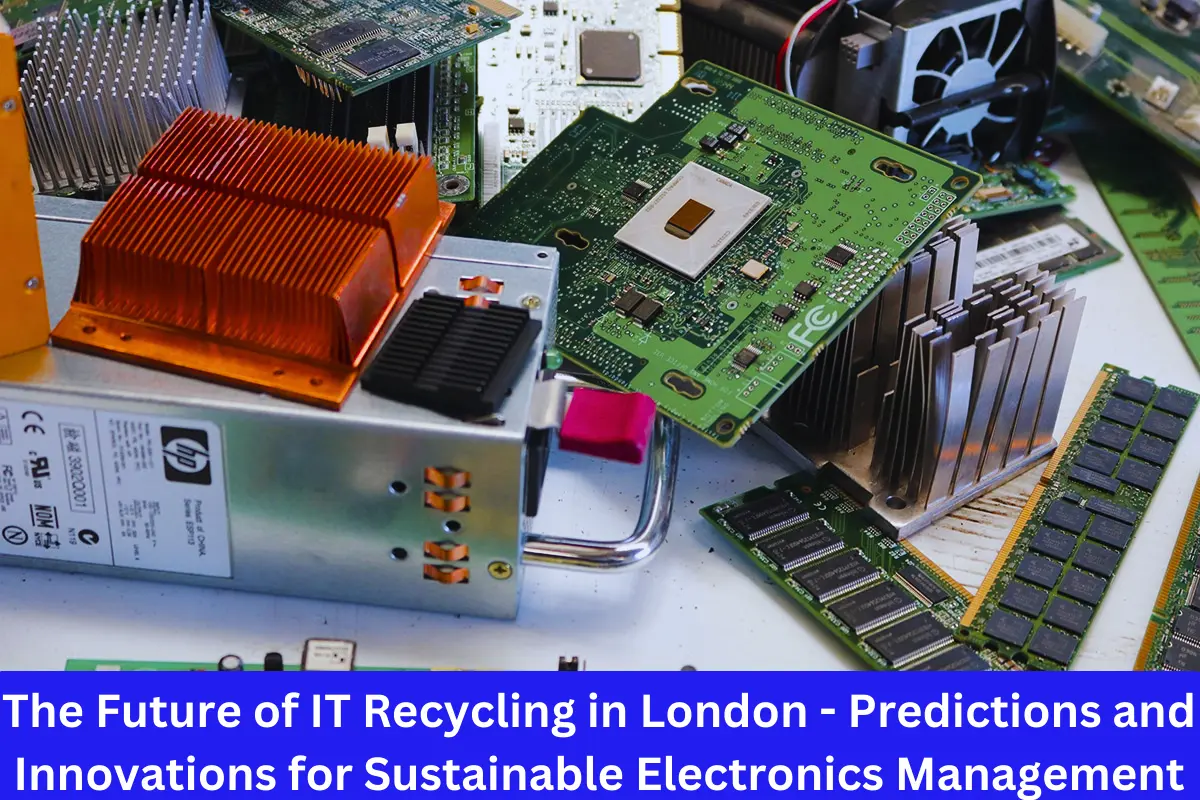In the dynamic landscape of technology and environmental sustainability, the future of IT recycling in London holds immense potential for innovation and transformation. As the demand for electronic devices continues to rise, so does the need for responsible disposal and recycling practices. In this comprehensive guide, we will explore the evolving trends, predictions, and innovations shaping the future of IT recycling in London, with a focus on sustainable electronics management.
The Growing Need for Sustainable Electronics Management:
With the rapid advancement of technology and the increasing ubiquity of electronic devices, the volume of electronic waste (e-waste) generated in London is on the rise. As a result, there is a pressing need for sustainable electronics management practices to mitigate the environmental impact of e-waste and promote resource conservation.
The Role of IT Recycling:
IT recycling plays a crucial role in managing e-waste by recovering valuable materials from end-of-life electronic devices and diverting them from landfills. However, traditional recycling methods face challenges such as limited capacity, resource constraints, and environmental concerns. The future of IT like laptop recycle London lies in adopting innovative solutions to address these challenges and create a more sustainable electronics management ecosystem.
Emerging Trends and Predictions
1. Circular Economy Models:
Prediction:
London will see an increase in circular economy initiatives focused on extending the lifespan of electronic devices through repair, refurbishment, and remanufacturing, thereby reducing the need for raw materials and minimizing waste.
Innovation:
Innovative business models such as product-as-a-service (PaaS) and leasing arrangements will emerge, encouraging consumers and businesses to use electronic devices more sustainably by promoting repairability and longevity.
2. Technological Advancements:
Prediction:
Advancements in technology, such as artificial intelligence (AI), machine learning, and robotics, will revolutionize the IT recycling industry in London, enabling more efficient sorting, disassembly, and recovery processes.
Innovation:
Automated sorting systems equipped with AI algorithms will streamline the identification and separation of different materials in electronic devices, maximizing resource recovery and minimizing waste.
3. Digital Tracking and Transparency:
Prediction:
There will be a greater emphasis on digital tracking and transparency throughout the IT recycling supply chain in London, enabling stakeholders to trace the journey of electronic devices from collection to recycling.
Innovation:
Blockchain technology will be leveraged to create transparent and immutable records of electronic device transactions, ensuring accountability and traceability while preventing fraud and counterfeit products from entering the recycling stream.
4. Collaborative Partnerships:
Prediction:
Collaborative partnerships between government agencies, businesses, non-profit organizations, and academic institutions will drive innovation and knowledge-sharing in the IT recycling sector in London.
Innovation:
Public-private partnerships will facilitate the development of shared infrastructure, resources, and expertise for laptop recycling services in UK, fostering a collaborative ecosystem focused on sustainability and circularity.
Innovations in Sustainable Electronics Management
1. Eco-Design and Product Stewardship:
Innovation:
Manufacturers will increasingly embrace eco-design principles and product stewardship initiatives, designing electronic devices with recyclability, reparability, and sustainability in mind from the outset.
Example:
Tech companies in London will collaborate with designers and engineers to create modular and upgradable electronic devices that can be easily disassembled and repaired, prolonging their lifespan and reducing e-waste.
2. Advanced Recycling Technologies:
Innovation:
London will witness the adoption of advanced recycling technologies such as pyrolysis, hydrometallurgy, and electrochemical processes to recover valuable metals, minerals, and materials from electronic waste more efficiently and sustainably.
Example:
Innovative start-ups will pilot novel recycling technologies that can extract rare earth elements, lithium, cobalt, and other critical materials from discarded electronic devices, reducing reliance on virgin resources and promoting resource independence.
3. Consumer Education and Engagement:
Innovation:
Educational campaigns and initiatives will empower consumers in London to make informed choices about electronic devices, encouraging responsible consumption, disposal, and recycling practices.
Example:
Tech companies and retailers will implement educational programs and incentives to incentivize consumers to recycle their old electronic devices responsibly, raising awareness about the environmental and social impacts of e-waste.
Challenges and Opportunities
1. Regulatory Frameworks:
Challenge:
Navigating complex regulatory frameworks and compliance requirements for IT recycling in London can pose challenges for businesses and organizations.
Opportunity:
Collaboration between government agencies, industry stakeholders, and policymakers will drive the development of robust regulatory frameworks that promote responsible electronics management and incentivize sustainable practices.
2. E-Waste Collection Infrastructure:
Challenge:
Limited e-waste collection infrastructure and accessibility can hinder the effective collection and recycling of electronic devices in London.
Opportunity:
Investment in e-waste collection infrastructure and expansion of collection points and recycling facilities will improve accessibility and convenience for consumers and businesses, encouraging greater participation in IT recycling initiatives.
3. Consumer Behavior:
Challenge:
Changing consumer behavior and attitudes towards electronic consumption and disposal can be challenging, particularly in a fast-paced urban environment like London.
Opportunity:
Education, awareness, and incentives will play a key role in shifting consumer behavior towards more sustainable practices, empowering individuals to make environmentally conscious choices about electronic devices and IT recycling.
Conclusion
The future of IT recycling in London is poised for innovation and transformation, driven by emerging trends, technological advancements, and collaborative partnerships focused on sustainable electronics management. By embracing circular economy models, leveraging technological innovations, promoting digital tracking and transparency, and fostering collaborative partnerships, London can lead the way in creating a more sustainable and circular electronics ecosystem. Through eco-design, advanced recycling technologies, consumer education, and regulatory frameworks, the city can overcome challenges and capitalize on opportunities to build a more resilient and resource-efficient IT recycling infrastructure for the future.

